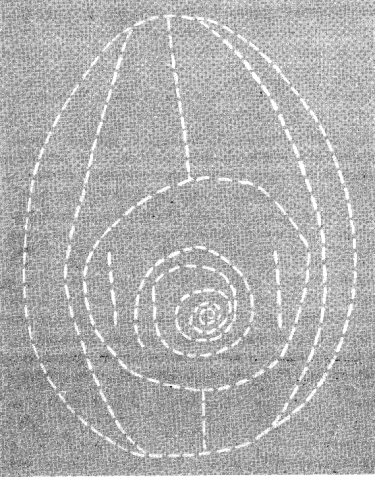Anatomy and Physiology of the Body that Isn't
Your own body is a phantom, one that your brain has temporarily
constructed purely for convenience.
—V. S. Ramachandran and S. Blakeslee
Foretelling
by weights, by strangers, by the texture of hair. by shade, by clouds, by itches, by piss.
by the shapes in smoke, by things accidentally heard or felt but unseen. by the bites of
spiders and geometry of webs. by the scratching of squirrels, by the grass in birds’ nests,
by the promptings of your soul. by snakes and cheese. by wind and rats. by striations
burned in bark and the shapes of lightning. by ashes, by buttocks, by boxes on steps. by
the bones of animals, burnt straw, and marks on the skin. by skulls and beetle tracks. by
the shuffle of your playlist. by the moon and worn-out shoes. by the riddle of bird shit.
by sleep.
by fire.
by stars and feral pigs. by needles, by dust, by the accidental formation of circles and
spheres. by fingernail moons and fingernail clippings. by the guts of roosters, soot and
scars. by salt, by scales, by flight patterns of bees. by breath, by arrows, by the trilling
of spring frogs. by bowls of brass. by wax, by noises of nameless origin. by scattering old
keys. by leaves. by sprouting onions, by dripping blood. by saints, by stones, by water,
by the yowling of cats. by the knife, by the lines in your face, hands, wrists. by the soles of
your feet and scribbling in the dark. by daily numbers and useless coins.
by horse.
by flower.
by computers when they quit, when they can take no more. by balloons when they burst.
by tears, the words of children, wrinkles formed in cloth. by the tiny explosions of breath in
mice, by the exertions of ants. by moonstones, by metal, by teeth. by shadows, by sneezes,
by what’s in thought. by your nose and eyes. by who you are. by science.
by what’s outside the window.
at the door.
––Louise Erdrich, The Sentence
Class Outline
Introduction
This is more a menu than an outline. The amount of time available (it might be an hour, it might be a week...), the scope of knowledge and the interest of the participants will change it. What I feel is salient any given day as well as new things that may come my way.
Anything reading like a statement of fact should be understood to be accompanied by a question: is this the case? Pretty much all knowledge is provisional; "Things thought too long can be no longer thought..."
We will be asking the questions through the practices of Ortho-Bionomy. Praxis: doing + reflecting + dialoguing
Phenomenology. For me, this means I will be staying as much as possible in my own experience. Look at the subjective experience rather than say anything about the "reality". One of my minor regrets. One of the first psychiatrists I worked with, Dr Murphy, told me, apropos of nothing, that he considered himself to be a phenomenologist. I have had from birth, probably a genetic component, a peculiar neurologic trait: I compulsively have to behave as if I know when I don't. The shame of not knowing. There should be a word for this. My task has been to embrace unknowing, not knowing. Finding the power latent in not knowing. Back to Dr. Murphy letting me know he is a phenomenologist. I responded as if I understood, as if there were now a pact between us. I had no idea what he meant. I was a nurse embryo. I assumed it would be revealed to me what phenomenological psychiatry entailed.
Poetics is a valid way of knowing. I think of poetics as the language of phenomenology. A more restricted sense of the word would have to do with rules about the production of poetry. This is mostly what Aristotle was about when he invented Poetics. The larger sense in which I use the word (thanks or apolgies to people like Donna Haraway and Édouard Glissant) is that poetics is the appropriate counter, doppelganger, to the prevailing and officially sanctioned ways of knowing. Holism balances reductionism.
Integrative Perspctive
What is Life? What are its Laws
Life is interiority, the "inside" of the world.
Inside/Outside begins with life
Perpetually becoming, never being
The cell and the membrane
The Way of the Cell: Molecules, Organisms and the Order of Life. Franklin M. Harold"
"...there is more to life than just molecular mechanics... "
"There can be no simple answer to the question, What is Life? It is an invitation to explore the successive levels of biological reality, and a lecture on molecular biology is intrinsically no more (and no less) illuminating than a walk through the woods in the springtime."
The Organism
Evolution
Life as a transition zone
Life as a mucus
Life is a Process
Systems Theory and Randomness
two kinds of stability: static and dynamic
at the fringe of life
What does life "do"? Non-vegetatively speaking
Senses
Computes
Evaluates (Selects)
Predicts
Moves
Holds
Lets go
Connects
Nothing
The primal value: ongoingness
Autopoiesis, homeostasis, self-repair, self-correction
What is the Body?
The Subjunctive Body (the Body Schema)
What is Movement
The Primacy of Movement, Maxine Sheets-Johnstone
All movement is bi-directional
How we move
The extended organism, the extended body
Enactivism; Body-Mind-World
The body without organs?
What is Human? Who gets to be counted as human? Human to what degree?
Nothing: Orthobionomy and the apophatic
The Sacred, A Metabolic Process?
Predictability and Colonialism
Body and Place
Healing and Magic
What is Illness, disease
Reductionism and Holism, Universe versus Multiverse. Healing is reconnecting to other worlds, and an expanding of self rather than reducing, restricting, isolating
Optimal Human Myth

